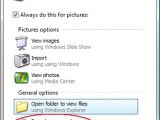Memory shortage is not an impediment to run Windows Vista with superior performances compared to those delivered by Windows XP on the same machine. With Vista it all comes down to horsepower. Consequently, 512 MB of RAM will be synonymous with an inferior performance when compared with Windows XP.
"The features in Windows Vista use a bit more memory to do the things that make it so cool, like indexing your data, keeping the fancier AERO UI running using the desktop window manager (DWM) etc. The less memory in your machine, the more often the OS must randomly access the disk. This slows system performs in cases where your applications just barely fit in memory on Windows XP but not quite in Windows Vista," revealed Jim Allchin, Co-President, Platform and Services Division.
Upgrading RAM is not the end of the world. But what happens if you just don't want more, but you are still keen on installing Vista? Well, the alternative is either a USB thumb drive or an SD card combined with Windows ReadyBoost. After connecting a Flash drive via a USB 2.0 socket, Windows Vista will display an autoplay interface from where you can choose the "Speed up my system using ReadyBoost" option.
Windows Vista will increase its performances by using the plugged in USB key as memory. "I should be clear that while flash drives do contain memory, Windows ReadyBoost isn't really using that memory to increase the main system RAM in your computer. Instead, ReadyBoost uses the flash drive to store information that is being used by the memory manager," explained Allchin.
On the USB drive, Windows ReadyBoost will create a copy of the virtual memory that will be accessed faster than the hard drive. 230 MB free on the flash drive is all the space it takes. "And because the Windows Readyboost cache on the flash drive is encrypted using AES-128, you don't need to worry about exposing sensitive data if the flash drive is stolen or lost. Also, the memory manager compresses the pages before writing them into the cache on the flash disk, which means you'll get more mileage from each MB," said Allchin.

 14 DAY TRIAL //
14 DAY TRIAL // 
